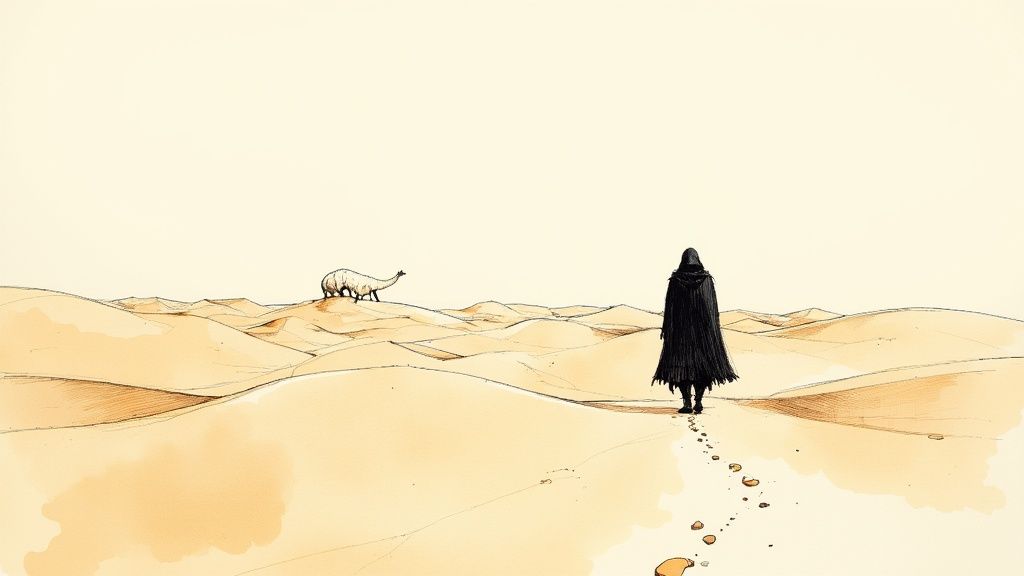In a world saturated with distractions, finding fiction books that truly captivate and challenge young readers is more important than ever. The right story does more than entertain; it builds empathy, sparks curiosity, and offers new perspectives on the world, shaping a reader's understanding for years to come. This curated list is designed for parents, educators, and young adults seeking literary adventures that go beyond the ordinary and leave a lasting impact.
We have selected foundational texts that have shaped generations, providing the context and literary groundwork upon which today's authors build. Understanding these classics is the first step toward appreciating the richer, more inclusive world of modern stories. To help young readers fully appreciate these complex literary works and develop a lifelong love for books, it's beneficial to also explore proven reading comprehension strategies that can deepen their engagement with any text.
This guide bridges the timeless with the contemporary. We will explore the classic fiction books that continue to inspire, while also highlighting the importance of discovering the modern, diverse voices championed by publishers like Number 6 Publishing. Let's dive into the titles that belong on every young reader's shelf.
1. To Kill a Mockingbird by Harper Lee
Harper Lee's Pulitzer Prize-winning novel remains one of the most essential fiction books for young readers. Set in the racially charged atmosphere of 1930s Alabama, the story unfolds through the innocent eyes of six-year-old Scout Finch. She watches her father, the principled lawyer Atticus Finch, defend Tom Robinson, a Black man falsely accused of a heinous crime.
The novel masterfully contrasts childhood adventures with the grim realities of prejudice and injustice. It serves as a powerful introduction to complex social issues, making it a cornerstone of middle and high school reading lists. Its enduring legacy is cemented by the Academy Award-winning 1962 film starring Gregory Peck and a recent, critically acclaimed Broadway adaptation.
Why It's a Must-Read
This book is more than a story; it is a profound lesson in empathy, integrity, and moral courage. It encourages readers to question societal norms and stand up for what is right, even when it is difficult. The narrative provides a safe yet impactful space to begin conversations about systemic racism and the justice system.
How to Approach This Classic
To fully appreciate To Kill a Mockingbird, consider these actionable tips:
- Explore Historical Context: Research the Jim Crow South to understand the social and legal landscape of the era. This context is crucial for grasping the characters' motivations and the story's stakes.
- Supplement with Diverse Voices: Pair this novel with works by contemporary Black authors. Reading books like The Hate U Give by Angie Thomas or Dear Martin by Nic Stone can provide a modern lens on the enduring themes of racial injustice.
- Discuss Key Themes: Use the book as a launchpad for discussions about empathy, perspective-taking, and what it means to have moral courage. Ask questions like, "Why did Atticus choose to defend Tom Robinson, knowing the consequences?"
2. 1984 by George Orwell
George Orwell's dystopian masterpiece is one of the most chilling and prophetic fiction books ever written. It plunges readers into the totalitarian superstate of Oceania, where the Party, led by the omnipresent Big Brother, exercises absolute control. The protagonist, Winston Smith, works for the Ministry of Truth, altering historical records, yet he secretly dreams of rebellion and freedom.

The novel's exploration of surveillance, propaganda, and psychological manipulation remains profoundly relevant today. Its concepts, like "thoughtcrime," "Newspeak," and "doublethink," have become part of our cultural lexicon, often cited in discussions of government overreach and the erosion of privacy. The term "Orwellian" itself is now shorthand for a society controlled by deceptive and authoritarian measures.
Why It's a Must-Read
This book is a vital warning about the dangers of unchecked power and the importance of individual thought. It forces readers to confront uncomfortable questions about freedom, truth, and reality. By illustrating how language can be used to control thought, 1984 provides a critical framework for analyzing political discourse and media in the modern world. For more details, you can explore our deep dive into the themes of 1984.
How to Approach This Classic
To get the most from Orwell's stark vision, consider these actionable tips:
- Understand the Historical Context: Research the rise of totalitarian regimes like Nazi Germany and the Soviet Union in the 1930s and 40s. Orwell’s experience in the Spanish Civil War and his observations of WWII heavily influenced the novel.
- Connect to Contemporary Issues: Discuss how themes of surveillance and data collection relate to modern technology, social media, and government monitoring programs.
- Analyze the Use of Language: Pay close attention to the principles of "Newspeak." Discuss how limiting language can effectively limit thought and dissent, a key tactic of the Party's control.
3. The Great Gatsby by F. Scott Fitzgerald
F. Scott Fitzgerald's quintessential American novel offers a dazzling and critical look at the Roaring Twenties. Among the most iconic fiction books taught in schools, the story is narrated by Nick Carraway, who becomes entangled in the lavish world of his mysterious, wealthy neighbor, Jay Gatsby. Gatsby's sole obsession is winning back his former love, Daisy Buchanan, leading to a tragic exploration of idealism, wealth, and the corruption of the American Dream.

The novel's glittering prose and sharp social commentary have ensured its place as a staple of American literature. Its timeless themes of love, loss, and social class continue to resonate, as evidenced by multiple major Hollywood film adaptations, including the acclaimed 1974 version starring Robert Redford and the visually stunning 2013 film with Leonardo DiCaprio.
Why It's a Must-Read
This book serves as a powerful cautionary tale about the pitfalls of materialism and the elusive nature of the past. It challenges readers to think critically about societal expectations and the definition of success. The intricate symbolism and layered characters make it a rich text for developing analytical and interpretive skills, which are crucial for advanced literary study.
How to Approach This Classic
To get the most out of The Great Gatsby, consider these actionable strategies:
- Analyze Key Symbolism: Pay close attention to recurring symbols like the green light, the eyes of Doctor T. J. Eckleburg, and the Valley of Ashes. Discuss what these symbols represent in the context of the novel's major themes.
- Question the Narrator: Consider Nick Carraway's role as a narrator. Is he reliable? How do his own judgments and biases shape the reader's perception of Gatsby and the other characters?
- Research the Jazz Age: Explore the historical and cultural context of the 1920s, including Prohibition, the post-WWI economic boom, and the era's social dynamics. This will illuminate the world Fitzgerald so vividly critiques.
4. Pride and Prejudice by Jane Austen
Jane Austen's masterpiece of wit and romance has captivated readers for over two centuries, making it one of the most beloved fiction books of all time. The story follows the headstrong and intelligent Elizabeth Bennet as she navigates the complex social circles of Regency-era England. Her initial disdain for the wealthy and aloof Mr. Darcy evolves into a profound love story that challenges the societal pressures of class, wealth, and reputation.
Austen's novel masterfully satirizes the marriage market of the 19th century while delivering a timeless romance. Its sharp social commentary and unforgettable characters have inspired countless film adaptations, including the iconic 1995 BBC series starring Colin Firth and the 2005 film with Keira Knightley. Its enduring plot has also spawned modern retellings and even genre-bending mashups like Pride and Prejudice and Zombies.
Why It's a Must-Read
This novel is the blueprint for the enemies-to-lovers romance trope and a brilliant study in character development. It teaches readers about the dangers of first impressions and the importance of looking beyond superficial social standing. The book is an essential exploration of female agency and intelligence in a society that often constrained both.
How to Approach This Classic
To fully appreciate the layers of Austen's work, consider these actionable tips:
- Appreciate the Irony: Pay close attention to Austen's satirical tone and witty dialogue. Much of the novel's humor and social critique is found in what is said between the lines.
- Analyze the Marriages: The novel presents various models of marriage, from the purely practical to the foolishly passionate. Compare the relationships of Charlotte Lucas, Lydia Bennet, and Jane Bennet to Elizabeth's journey.
- Consider the Social Context: Research the constraints and expectations placed upon women in Regency England. Understanding their limited options for financial security and social standing highlights the significance of Elizabeth's choices.
- Track Character Arcs: Notice how Elizabeth and Darcy both must overcome their personal flaws, pride, and prejudice, in order to find happiness together. This mutual growth is central to the story's power.
5. One Hundred Years of Solitude by Gabriel García Márquez
Gabriel García Márquez's masterpiece is a landmark of 20th-century literature and a dazzling example of magical realism. This sprawling, multi-generational saga chronicles the rise and fall of the Buendía family and the mythical town of Macondo they founded. It masterfully weaves together the extraordinary and the everyday, creating one of the most unique fiction books ever written.

The novel is a defining work of the Latin American Boom and earned García Márquez the Nobel Prize in Literature in 1982. Its influence is immense, with Gregory Rabassa's celebrated English translation bringing its lyrical beauty to a global audience. The story explores profound themes like solitude, the cyclical nature of time, and the intersection of myth and reality, all wrapped in a narrative that is both epic and deeply intimate.
Why It's a Must-Read
This book expands the very definition of what a novel can be. It challenges readers to embrace ambiguity and find wonder in the surreal. Its complex narrative serves as a powerful metaphor for Latin American history, exploring the impacts of colonialism, civil war, and modernization through the lens of one unforgettable family. It's a journey that rewards patience with unparalleled literary richness.
How to Approach This Classic
To navigate the intricate world of Macondo, consider these actionable tips:
- Map the Family Tree: The Buendía family reuses names, which can be confusing. Keep a simple chart or family tree to track characters and their relationships as you read.
- Embrace Magical Realism: Don't try to find logical explanations for the magical events, like flying carpets or a five-year-long rainstorm. Accept them as a natural part of the story's world.
- Research the Context: A basic understanding of 19th and 20th-century Colombian history can enrich your reading by revealing the real-world events that inspired the novel's fictional conflicts.
- Read Deliberately: García Márquez's prose is dense and poetic. Read slowly, perhaps even aloud, to fully savor the rhythm and imagery of his sentences.
6. The Lord of the Rings Trilogy by J.R.R. Tolkien
J.R.R. Tolkien's epic high-fantasy series is a towering achievement in literature and a foundational work for the modern fantasy genre. These classic fiction books transport readers to the richly detailed world of Middle-earth, following the hobbit Frodo Baggins on his perilous quest to destroy the One Ring and defeat the Dark Lord Sauron. The trilogy is a monumental tale of fellowship, courage, and the enduring struggle between good and evil.
The story combines grand-scale battles with intimate moments of friendship and sacrifice, weaving together intricate lore, invented languages, and a vast mythology. Its influence is immense, shaping everything from video games and Dungeons & Dragons to the acclaimed film adaptations by Peter Jackson. This series remains a benchmark for epic world-building and heroic storytelling.
Why It's a Must-Read
This trilogy is more than an adventure; it is an exploration of themes like temptation, loss, and hope in the face of overwhelming darkness. It demonstrates how even the smallest person can change the course of history through bravery and perseverance. The intricate world and deep character development provide an immersive reading experience unlike any other. For a deeper dive into its impact, you can learn more about The Lord of the Rings on Number 6 Publishing.
How to Approach This Classic
To fully immerse yourself in the world of Middle-earth, consider these actionable tips:
- Start with The Hobbit: For younger readers or those new to Tolkien, his prequel novel, The Hobbit, offers a more lighthearted and accessible entry point into the world and its history.
- Use the Maps: Don't ignore the maps included in the books. Following the characters' journey visually makes the expansive world feel more grounded and understandable.
- Take Breaks: The dense prose and epic scope can be daunting. Feel free to read one volume at a time with other books in between to avoid feeling overwhelmed.
7. Beloved by Toni Morrison
Toni Morrison's Pulitzer Prize-winning masterpiece, Beloved, is a profound and haunting exploration of the legacy of slavery. This powerful entry in the world of fiction books tells the story of Sethe, a woman who escaped slavery but remains psychologically chained to her traumatic past. The narrative is driven by the spectral presence of her unnamed daughter, whose ghost inhabits her home and forces a confrontation with memories she has long suppressed.
Morrison’s lyrical prose and non-linear storytelling create a deeply immersive experience, weaving together memory, pain, and the supernatural. The novel is a cornerstone of American literature and required reading in many courses, cemented by its 1998 film adaptation starring Oprah Winfrey. It masterfully explores themes of memory, trauma, and the dehumanizing impact of slavery on individuals and generations.
Why It's a Must-Read
This book offers an unflinching look at the psychological wounds of slavery, moving beyond historical facts to capture its deep, personal costs. It challenges readers to confront uncomfortable truths about American history and the enduring nature of trauma. Beloved is an essential read for understanding the complexities of memory and the struggle for freedom in its fullest sense. To explore more essential works, you can find a curated list of the best African American books.
How to Approach This Classic
To engage with the depth and complexity of Beloved, consider these actionable strategies:
- Prepare Emotionally: The novel contains disturbing and emotionally intense content. Acknowledge this beforehand and allow yourself space to process the difficult themes it presents.
- Read Slowly and Attentively: Morrison's narrative is layered and non-chronological. Pay close attention to shifts in time and perspective to fully absorb the intricate storytelling.
- Focus on Symbolism: Watch for recurring motifs, such as water, milk, and the color red. Analyzing these symbols will unlock deeper layers of meaning and enhance your understanding of the characters' inner worlds.
8. The Catcher in the Rye by J.D. Salinger
J.D. Salinger's landmark novel is a seminal text in the canon of young adult fiction books, capturing the essence of teenage angst and alienation. The story is famously narrated by Holden Caulfield, a disillusioned sixteen-year-old who recounts his experiences in New York City after being expelled from his prep school. His cynical observations on the adult world and its perceived "phoniness" have resonated with generations of readers.
The novel's raw, first-person narrative and exploration of complex themes like depression, identity, and the painful transition to adulthood were groundbreaking. Its controversial nature has led to frequent challenges and bans, yet its influence on literature and popular culture remains undeniable. The Catcher in the Rye provides a starkly realistic psychological portrait of a teenager struggling to find his place in a world he doesn't understand.
Why It's a Must-Read
This book offers an unflinching look at the inner turmoil of adolescence. It validates feelings of confusion and isolation that many young people experience, acting as a powerful tool for discussing mental health and the pressure to conform. Holden’s voice, though often cynical, is deeply human and offers a gateway to understanding the complexities of growing up.
How to Approach This Classic
To get the most from Salinger’s work, consider the following actionable tips:
- Look Beyond the Surface: Try to see past Holden's constant complaining and negativity to understand the profound pain and grief driving his behavior. His actions are often a cry for help and connection.
- Analyze Key Relationships: Examine Holden’s interactions with his younger sister Phoebe, his former teacher Mr. Antolini, and others. These relationships reveal different facets of his character and his deep-seated desire for genuine connection.
- Discuss Authenticity: Use the novel to spark conversations about what it means to be "phony" versus authentic. Ask questions like, "Are Holden's judgments of others fair, and what is he looking for in people?"
9. Dune by Frank Herbert
Frank Herbert’s science fiction epic is one of the most celebrated and influential fiction books ever written. Set on the harsh desert planet Arrakis, the sole source of a priceless consciousness-expanding substance, the story follows young Paul Atreides. He must navigate a treacherous landscape of political betrayal, giant sandworms, and his own emerging messianic destiny.

Herbert created an immersive universe that masterfully weaves together complex themes of power, religion, ecology, and human potential. The world of Dune is so rich and detailed that it has spawned numerous sequels, prequels, and adaptations, including Denis Villeneuve's recent blockbuster films. Its profound influence can be seen across countless science fiction works, video games, and board games.
Why It's a Must-Read
This book is a masterclass in world-building and an excellent entry point into more mature science fiction. It challenges readers to think critically about resource control, political manipulation, and the environment. The intricate plot and deep philosophical questions make it a rewarding read that stays with you long after the final page, sparking curiosity about ecology and sociology.
How to Approach This Classic
To fully immerse yourself in the world of Arrakis, consider these actionable tips:
- Use the Glossary: The novel includes complex terminology. Don't be afraid to frequently reference the glossary at the back of the book to keep track of key terms, houses, and concepts.
- Pay Attention to Themes: Focus on the interconnected themes of politics and ecology. Consider how control of Arrakis’s primary resource, the spice, mirrors real-world conflicts over oil and water.
- Don’t Rush the Beginning: The initial chapters introduce many characters, factions, and political dynamics. Take your time to absorb this setup, as it is essential for understanding the rest of the story.
9 Classic Fiction Books Comparison
| Title | Implementation Complexity 🔄 | Resource Requirements ⚡ | Expected Outcomes 📊 | Ideal Use Cases 💡 | Key Advantages ⭐ |
|---|---|---|---|---|---|
| To Kill a Mockingbird | Moderate narrative complexity with dual timelines | Low (standard reading) | Deep social and moral insight into racial injustice | Educational settings, social justice discussions | Timeless themes, rich character development |
| 1984 | Moderate complexity with political allegory elements | Low (reading and analysis) | Heightened awareness of surveillance and authoritarianism | Political science and privacy debates | Prophetic relevance, cultural impact |
| The Great Gatsby | Moderate complexity with symbolism and unreliable narration | Low to moderate (reading with some research) | Critical perspective on American Dream and 1920s society | Literature courses focusing on symbolism and history | Lyrical prose, rich symbolism |
| Pride and Prejudice | Moderate complexity with social satire and character arcs | Low (reading) | Insight into Regency social dynamics and romance | Romance genre studies, social commentary classes | Sharp wit, strong female protagonist |
| One Hundred Years of Solitude | High narrative complexity with magical realism | Moderate to high (careful reading and context) | Deep understanding of Latin American culture and history | Magical realism exploration, cultural studies | Innovative storytelling, poetic language |
| The Lord of the Rings Trilogy | High complexity due to extensive world-building | High (time investment across trilogy) | Epic fantasy experience with moral and mythological depth | Fantasy genre study, epic narrative analysis | Unparalleled world-building, genre influence |
| Beloved | High complexity with nonlinear narrative and trauma themes | Moderate (careful and emotional reading) | Profound exploration of slavery’s psychological impact | African American literature, trauma studies | Powerful narrative, psychological depth |
| The Catcher in the Rye | Moderate complexity with stream-of-consciousness narration | Low (reading) | Insight into adolescent alienation and mental health | Coming-of-age literature, psychological analysis | Authentic teenager voice, cultural impact |
| Dune | High complexity with dense world-building and politics | High (attention to detail and glossary use) | Broad understanding of ecological, political themes | Science fiction studies, ecological narrative analysis | Unmatched sci-fi world-building, thematic depth |
Continue Your Reading Adventure with Today's Voices
The nine literary masterpieces we've explored represent monumental achievements in storytelling. From the social commentary of To Kill a Mockingbird to the intricate world-building of The Lord of the Rings, these classic fiction books have shaped generations of readers and writers. They provide a foundational understanding of character, plot, and theme, offering timeless wisdom that continues to resonate. These works are not just stories; they are cultural touchstones that challenge our perspectives and deepen our empathy.
However, the literary landscape is not a museum of past accomplishments. It is a vibrant, ever-expanding universe teeming with new voices and fresh narratives. The true value of reading the classics is that they equip us with the critical tools to appreciate the innovation and diversity of contemporary storytelling. They are the starting point of a lifelong literary journey, not the final destination.
Your Next Chapter: Bridging Classics with Contemporary Reads
The adventure continues as you venture from these established pillars into the dynamic world of modern middle grade and young adult literature. Independent authors and publishers are at the forefront of this new wave, crafting stories that speak directly to the challenges, joys, and complexities of today's world. These are the fiction books that reflect the diverse experiences of young readers, offering them characters who look, feel, and think like they do.
To actively build your reading horizons, consider these actionable steps:
- Create a "Then and Now" Reading List: Pair a classic from this list with a modern book that explores similar themes. For example, after reading about the societal structures in 1984, you could explore a modern YA dystopian novel that tackles issues of surveillance and freedom in the digital age.
- Seek Out Underdog Voices: Make a conscious effort to read books from independent publishers like Number 6 Publishing. These platforms are dedicated to discovering and championing authors who bring unique perspectives, such as those found in heartfelt tales like A Complicated Journey and Eleanor the Mockingbird.
- Explore New Formats and Genres: The world of modern fiction is incredibly diverse. For readers exploring contemporary narratives, diving into popular titles and contemporary fantasy and mystery series like 'Lord of the Mysteries' can provide exciting new literary adventures, blending familiar tropes with innovative storytelling techniques.
By actively seeking out new fiction books, you are not just finding entertainment; you are participating in a global conversation. You are supporting the artists who are brave enough to tell new stories and ensuring that the literary world remains a rich, inclusive, and relevant space for everyone. Your next favorite book is out there, waiting to be discovered on a shelf, in a library, or through a passionate independent press. The journey is just beginning.
Are you ready to discover the next generation of captivating stories? Number 6 Publishing is committed to bringing diverse and imaginative middle grade and YA fiction books from underdog authors to young readers, parents, and educators. Explore our catalog and find your next unforgettable adventure today at Number 6 Publishing.
